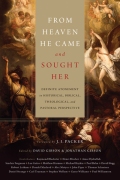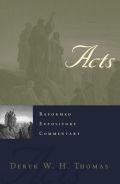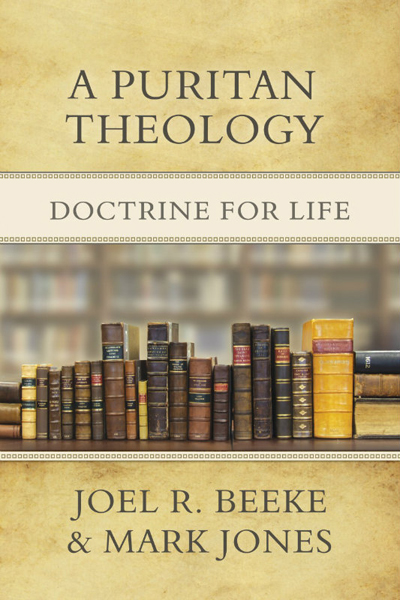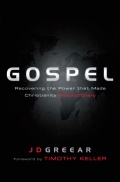The following is an adaptation of a presentation I gave at the latest Northwest Ohio Reformation Society meeting. Our topic was “Redemption Accomplished and Applied,” borrowing from John Murray’s classic text on the gospel. I was tasked with covering the application of redemption and decided to focus on the nature and extent of the atonement.
What is Redemption?
According to Baker’s Evangelical Dictionary of Biblical Theology, the concept of redemption “includes the ideas of loosing from a bond, setting free from captivity or slavery, buying back something lost or sold, exchanging something in one’s possession for something possessed by another, and ransoming.” In the Old Testament, there are three main ideas involving redemption: substitution, deliverance, and atonement. These themes are gradually unfolded throughout the Old Testament, and in the inter-testemental period (roughly 400 years between the time of Malachi and the birth of Jesus) they were generally understood to have an eschatological or end times’ fulfillment in the Messiah. They drew parallels from the bondage of Israel and Babylonian captivity and their own temporal circumstances or physical reality. While many people alive during Jesus’ earthly ministry saw the Messiah as a victorious military leader who would conquer Rome, deliver Israel from oppression, and set up a material Kingdom, we see from the New Testament documents that Jesus Messiah had other plans—His kingdom is not of this world (John 18:36). God’s plan for substitution, deliverance, and atonement involved the sinless Christ who would deliver His people from their sin as a vicarious propitiatory sacrifice. He would provide pardon and reconciliation by satisfying the wrath of God with His precious blood.
Redemption Accomplished
In the first section of his book, “Redemption Accomplished and Applied”, John Murray writes about four aspects of redemption, or the atonement of Jesus Christ; namely, its necessity, nature, perfection, and extent. I’d like to focus on the nature and extent of the atonement in this post.
The Nature of the Atonement
The redemptive work of Jesus Christ is a labor of obedience. According to John 5:30, Jesus says “I can do nothing on My own initiative. As I hear, I judge; and My judgment is just, because I do not seek My own will, but the will of Him who sent Me.” Likewise, in John 6:38, He says “I have come down from heaven, not to do My own will, but the will of Him who sent Me.” So, Jesus will was perfectly in tune with the Father’s. He lived a life of perfect obedience to God the Father. The Apostle Paul puts it this way in Romans 5:19: “through the one man’s disobedience the many were made sinners, even so through the obedience of the One the many will be made righteous.” He incorporates federal headship to explain the nature of the atonement. In other words, Adam our representative, committed cosmic treason and we have been alienated from God… but if we are united in Christ, if He is our representative—our federal head, we have been reconciled with the Father through the obedience of Christ. Theologians typically identify two types of obedience: Active and Passive.
Active Obedience
When we speak of “active obedience,” we are essentially talking about the life of Christ. While the active and passive obedience of Jesus should not be so starkly contrasted and categorized to indicate no overlap or continuity, for our purposes today, we will approach this aspect of obedience as his perfection with regard to the Law. Murray explains, “Christ as the Vicar [or representative] of His people came under the curse and condemnation due to sin and He also fulfilled the law of God in all its positive requirements. In other words, He took care of the guilt of sin and perfectly fulfilled the demands of righteousness. He perfectly met both the penal [or judicial] and the preceptive [or legal] requirements of God’s law.” (pp. 21–22) Paul says that “when the fullness of the time came, God sent forth His Son, born of a woman, born under the Law, so that He might redeem those who were under the Law, that we might receive the adoption as sons.” (Gal. 4:4–5) Calvin comments: “from the time when he took on the form of a servant, he began to pay the price of liberation in order to redeem us.” (Institutes, 2.16.5)
Passive Obedience
When we say “passive,” it does not mean that Jesus was somehow absent from His exertion of obedience. Generally speaking, the passive obedience of Christ refers to His humbling Himself by becoming obedient to the point of death… on a cross (Phil. 2:8). According to Murray, this “obedience was vicarious [substitutionary] in the bearing of the full judgment of God upon sin, and it was vicarious in the full discharge of the demands of righteousness. His obedience becomes the ground of the remission of sin and of actual justification… It was that obedience, brought to its consummate fruition on the cross, that constituted Him an all-sufficient and perfect Savior.” (pp. 22, 23) The classic Old Testament Messianic prophecy of the Suffering Servant helps us here:
“He was despised and forsaken of men, A man of sorrows and acquainted with grief; And like one from whom men hide their face He was despised, and we did not esteem Him. Surely our griefs He Himself bore, And our sorrows He carried; Yet we ourselves esteemed Him stricken, Smitten of God, and afflicted. But He was pierced through for our transgressions, He was crushed for our iniquities; The chastening for our well-being fell upon Him, And by His scourging we are healed. All of us like sheep have gone astray, Each of us has turned to his own way; But the Lord has caused the iniquity of us all To fall on Him.” (Isaiah 53:3–6)
We see here the language of substitutionary sacrifice… “He bore our griefs,” “He carried our sorrows,” “He was pierced through for our transfgressions,” “He was crushed for our iniquities,” “The chastening for our well-being fell upon Him,” “we are healed by His scourgings,” “the Lord has cause the iniquity of us all to fall on Him.” Over and over, we read of the Messiah’s vicarious atonement.
Moving on, I’d like for us to take a look at a few of the concepts related to the atonement. Namely, Sacrifice, Propitiation, and Reconciliation.
Sacrifice
The sacrificial theme is at the heart of the Scriptures. We see in Genesis 22 when Abraham was to sacrifice Isaac, the Lord provided a substitutionary sacrifice via the ram in the thicket (v. 13). In Exodus 12, the Passover Lamb was an unblemished sacrifice that was slaughtered and the blood was a sign for the Lord’s wrath to “pass over” the households of the faithful. The Levitical system also has substitutionary and sacrificial relevance. Michael Lawrence points out the following details in his book “Biblical Theology in the Life of the Church” (pp. 156–157):
- Only clean animals without defect can be sacrificed.
- Every firstborn Israelite, who represents the nation as a whole, must be redeemed with a sacrificial substitute.
- Prominent is the taking of life and the shedding of a blameless victim’s blood.
- The idea of a substitute is also prominent… if anyone brings a sacrifice, “He is to lay His hand on the head of the burnt offering and it will be accepted on his behalf.” (Lev. 1:4)
- Sacrifices now begin and end every single day in God’s temple, presented by priests who serve as intermediaries between God and His sinful people.
- There are additional sacrifices that mark the beginning of each week, each month, and each season.
- At the pinnacle of this entire system of sacrifice was the Day of Atonement. The high priest alone took the blood of the sacrifice into the Holy of Holies and sprinkled the blood on the mercy seat, the symbolic throne of God, to make atonement for His own sins and the sins of the people.
In the New Testament, it is plain to see that Jesus is the culmination and fulfillment of this sacrificial element of true religion. John the Baptizer calls him “the Lamb of God who takes away the sin of the world” (John 1:29). The Apostle Paul likewise says that “Christ our Passover… has been sacrificed.” (1 Cor. 5:7). The author of Hebrews also says that He offered Himself up as a sacrifice once for all (Heb. 7:28) and “at the consummation of the ages He has been manifested to put away sin by the sacrifice of Himself.” (Heb. 9:26)
Propitiation
Secondly, we see the language of propitiation with regard to redemption. Propitiation, according to Murray, “presupposes the wrath and displeasure of God, and the purpose of propitiation is the removal of this displeasure.” (p. 30) In other words, propitiation is satisfaction and/or removal of the wrath of God. It is fascinating that the word for “mercy seat” (‘kap-oh-reth’ in Hebrew), which was the lid to the Ark of the Covenant, was rendered “propitiatorium” (which means the place of propitiation) when the Old Testament was translated into Latin. While the mercy seat in the Levitical context, where the sprinkled blood of the spotless lamb symbolized propitiation… the true mercy seat and the true Lamb of God, Jesus Christ, made absolute propitiation by the shedding of His blood. According to Scripture, “God displayed [Jesus] publicly as a propitiation in His blood through faith.” (Rom. 3:25) “He loved us and sent His Son to be the propitiation for our sins.” (1 John 4:10) “He had to be made like His brethren in all things, so that He might become a merciful and faithful high priest in things pertaining to God, to make propitiation for the sins of the people.” (Heb. 2:17)
Reconciliation
Lastly, with regard to the nature of the atonement, I’d like to shift focus to reconciliation. As I mentioned earlier, sinful humanity has been estranged from God. The accomplishment of redemption reconciles sinners with the Holy God. Paul writes in Romans:
“God demonstrates His own love toward us, in that while we were yet sinners, Christ died for us. Much more then, having now been justified by His blood, we shall be saved from the wrath of God through Him. For if while we were enemies we were reconciled to God through the death of His Son, much more, having been reconciled, we shall be saved by His life. And not only this, but we also exult in God through our Lord Jesus Christ, through whom we have now received the reconciliation.” (Rom. 5:8–11)
Furthermore, we see the grace of God in reconciling us to Himself by the words of Paul in 2 Corinthians: “if anyone is in Christ, he is a new creature; the old things passed away; behold, new things have come. Now all these things are from God, who reconciled us to Himself through Christ and gave us the ministry of reconciliation, namely, that God was in Christ reconciling the world to Himself, not counting their trespasses against them, and He has committed to us the word of reconciliation. Therefore, we are ambassadors for Christ, as though God were making an appeal through us; we beg you on behalf of Christ, be reconciled to God. He made Him who knew no sin to be sin on our behalf, so that we might become the righteousness of God in Him.” (2 Cor. 5:17–21)
Not only has God reconciled a people to Himself in Christ, but by His grace, He has made Christians ambassadors of reconciliation! Listen to Murray again: “The reconciliation of which the Scripture speaks, as accomplished by the death of Christ, contemplates… the relation of God to us. It presupposes a relation of alienation and it effects a relation of favor and peace. This new relation is constituted by the removal of the ground for the alienation. The ground is sin and guilt. The removal is wrought in the vicarious work of Christ, when He was made sin for us that we might become the righteousness of God in Him. Christ took upon Himself the sin and guilt, the condemnation and the curse of those on whose behalf He died. This is the epitome of divine grace and love. It is God’s own provision and it is his accomplishment. God Himself in His own Son has removed the ground of offence and we receive the reconciliation.” (p. 42) God is the divine benefactor of reconciliation. He has taken the initiative upon Himself to accomplish redemption for His people. This leads us to the scope or extent of the atonement.
The Extent of the Atonement
The extent of the atonement is quite a hot-button issue. There has been no shortage of debate over the question: “for whom did Christ die?” The doctrine known as “Limited Atonement” is often misunderstood and gets a bad rap since the name seems to imply that there are limitations to the redemptive work of Christ. In discussion about the extent of the atonement, it has been observed that regardless of one’s position… everyone “limits” the atonement in one way or another. The Calvinist believes that the extent or scope of the atonement is limited in that it is reserved for a particular people—namely, the Church. But the Arminian limits the efficacy or power of the atonement by saying that Christ died for all people, even those who deny Him and await judgment and hell. This brings us to an important thing to consider when the question, “for whom did Christ die?” An appropriate follow-up question would be, “to whom is the atonement applied to?”
As I mentioned, the concept of “limited atonement” is often misconstrued. Partially responsible, is the terminology employed. A more appropriate phrase that many of you will undoubtedly be familiar with is “Particular Redemption.” This term is to be preferred since it alludes to the doctrine of election: there is a particular group of people (i.e. the Church) who will be redeemed. Also implied in this is that there is a certainty of accomplishment. Another expression that is employed is “Definite Atonement,” which carries a similar sentiment. Redemption was not just made possible by the work of Christ—it was actually accomplished. Murray points out, “[Redemption] does not mean redeemability, that we are placed in a redeemable position. It means that Christ purchased and procured redemption.” (p. 63) According to Titus 2:14, He “gave Himself for us to redeem us from every lawless deed, and to purify for Himself a people for His own possession, zealous for good deeds.” The atonement which Christ has made is effectual. As the accomplishment of redemption is effective, so is the application of it. This brings up an important point I alluded to earlier… those who receive the Holy Spirit—those who are born again by the effecual power of the Holy Spirit—are the same people whom Christ has died for. He has accomplished redemption for a particular people and they are the recipients of the benefits and blessings of its application.
I’d like to conclude by pointing out an important New Testament truth that Murray touches on… the fact that “those for whom Christ died, have themselves also died in Christ.” (p. 69) Paul writes in Romans 6 that “we have been buried with Him through baptism into death, so that as Christ was raised from the dead through the glory of the Father, so we too might walk in newness of life. For if we have become united with Him in the likeness of His death, certainly we shall also be in the likeness of His resurrection, knowing this, that our old self was crucified with Him, in order that our body of sin might be done away with, so that we would no longer be slaves to sin; for he who has died is freed from sin.” (Rom. 6:4–7) Those who believe the gospel and trust in the Person and work of Christ have died with Him, been buried with Him, and will be resurrected and glorified in Him. It is evident here, that the answer to the question, “for whom did Christ die?” is “those who have died in Christ and have been raised to new life.”
Now, it is important to point out that this is a doctrine to throw around carelessly. We must exercise wisdom and pastoral concern with regard to “Particular Redemption.” Often, this teaching is oddly criticized because it appears to be elitist. That is, detractors imply that proponents of Definite Atonement are arrogant and have reason to boast since they have been chosen by God. This cannot be farther from the truth. Paul points in Ephesians 2 that we have been saved by grace through faith… it is not of ourselves—it is a gift of God—we cannot boast in our works. (Eph. 2:8–9) This doctrine is not of arrogance… it is of humiliation! There is nothing special in us that compels God to save us… it is because of the sovereign good pleasure of God that He decides to set His love upon us. The doctrine of election is not a very popular teaching in contemporary evangelicalism… but it is biblical. And we should faithfully preach it and teach it in our churches, emphasizing the grace of God in salvation for His glory.
For more on this subject, please visit the Systematic Theology page.
Recommended reading:




 Waters, Guy Prentiss. “Acts: EP Study Commentary,” Evangelical Press, Watchmead, UK: 2014. 614 pp. $44.99
Waters, Guy Prentiss. “Acts: EP Study Commentary,” Evangelical Press, Watchmead, UK: 2014. 614 pp. $44.99





















